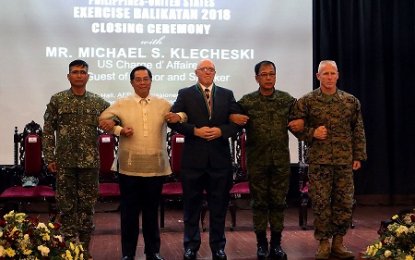News
PH, US troops gained much from ‘Balikatan’ exercises

BALIKATAN EXERCISES CLOSING. Philippine Exercise Director for Balikatan 2018 Lt. Gen. Emmanuel Salamat, Department of National Defense (DND) Undersecretary Cardozo Luna, US Charge d’ Affaires Michael Klecheskie, Armed Forces of the Philippines (AFP) Chief-of-Staff Lt. Gen. Carlito Galvez Jr., and US Officer Conducting Exercise Balikatan Exercise 2018, Thomas Weidley, pose for a photo opportunity during the closing ceremony of the Armed Forces of the Philippines-United States Armed Forces Balikatan Exercise 2018 held at Camp Aguinaldo, Quezon City on Friday (May 18, 2018). (PNA photo by Joey O. Razon)
MANILA — Participating Filipino and American troops have gained much expertise in the two-week “Balikatan” exercises which formally closed Friday, said Philippine “Balikatan” exercise director Lt. Gen. Emmanuel Salamat.
“We close this year’s ‘Balikatan’ exercises with both Philippine and US forces (gaining) maximum benefits from the various training exchanges and cooperation. It provided venue for lot of more learning opportunities but also extended significant community assistance that gained popular support of less fortunate people in selected area in Northern Luzon. The BK 2018 manifests our commitment and responsibility to pursue cooperation and interoperability of both our forces,” Salamat said.
Closing ceremonies took place at the Armed Forces of the Philippines (AFP) Commissioned Officers Club in Camp Aguinaldo, Quezon City. Some 5,000 Filipino and 3,000 American soldiers participated in this year’s Balikatan activities that began mid-April, prior to the opening ceremony last May 7.
They took part in a series of planning and simulation exercises, operational training events, and civic activities held in the northern part of the Philippines. Troops from the Australian Defence Force and Japan Self-Defense Force also joined in some of the drills. Their participation was under the ambit of the US alliance system.
“Our militaries have grown together in friendship, provided a benefit to countless people, and are better prepared to respond as one cohesive team to any crisis or challenge that may threaten the peace and stability that our alliance has helped to secure,” said Brig. Gen. Thomas Weidley, the US officer conducting the “Balikatan” exercises.
The planning and simulation exercises were held at the North Luzon Command headquarters in Camp Aquino, Tarlac.
The training focused on the themes of mutual defense, counterterrorism, and humanitarian assistance and disaster response during scenarios of calamity, internal conflict, and chemical, biological, radiological and nuclear attack.
Among the operational training events successfully conducted were the amphibious landing exercise in San Antonio, Zambales, and combined arms live-fire exercise in Tarlac.
These events were aimed at enhancing interoperability of troops in sea-to-land operations, as well as actions on the ground and in the air. Other field training sessions were held in military camps and facilities in Northern Luzon.
A total of five new school buildings were built by Filipino, US, Japanese, and Australian service members under “Balikatan” civic activities.
These one-storey, two-classroom buildings were dedicated to elementary schools in Santa Teresita, Cagayan; Alibagu, Ilagan City, Isabela; San Antonio, Ilagan Isabela; Calangitan, Capas, Tarlac; and Cabu, Cabanatuan City.
Troops also installed drainage systems, sidewalks, and water catchment systems within the selected schools. Medical engagements and spiritual enhancement activities were also conducted in these areas.





















